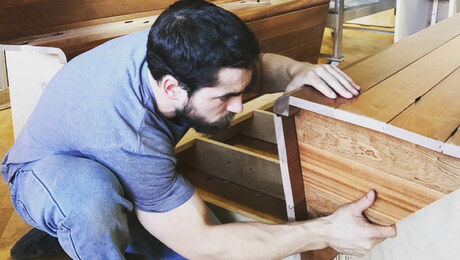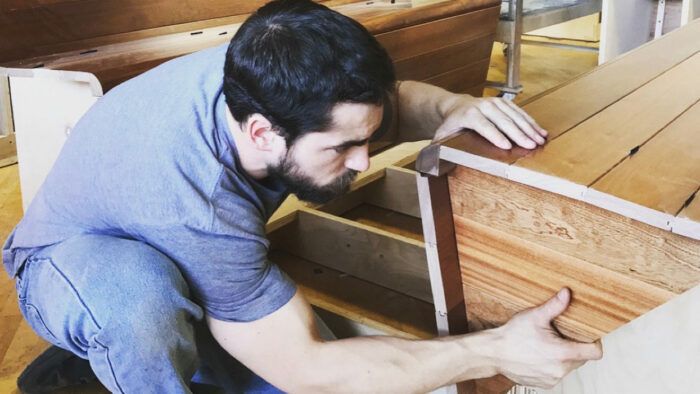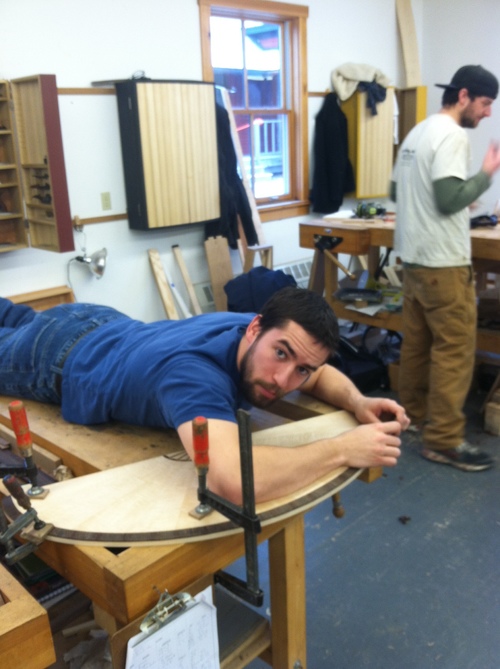We’ve all had that moment. Perhaps it was in your garage workshop. Maybe you were watching your grandparent make something so delicate and skillful you were fascinated by the process. Or you may have been like me, sitting in your college dorm room with DVDs of woodworking projects (yes, I remember the days before YouTube) taking in the woodworking gospel as ravenously as a congregant at a tent revival. And the thought hits us. We stop, stare off into the distance for a brief moment, and mutter to ourselves “This … this is what I’m going to do for the rest of my life. I’m going to be a professional woodworker.” It’s a profound moment. But looking back at it 15 or so years on, I would ask myself a different question: Do you want simply to make beautiful objects or do you want to be a small business owner?
Now I’ll give the spoiler right here–if I were to do it all again, I would do it all the same. I love what I do. And that’s saying something. When you do anything for 12 hours a day nearly every day for years on end it’s bound to lose some of its luster. Work is work, after all, and hard work is hard. But being a “professional” woodworker doesn’t necessarily make me a better one than others. I know plenty of seasoned woodworkers who could hand-cut-joinery me right out of the conversation, and still more who explore weird niches of the woodworking world. As a strong advocate for people finding their artistic voices, I know that those “hobbyists” have a real advantage I don’t: time to play.
I have a friend named Paul. You may know him as @copper_pig_fine_woodworking on Instagram. A scientist by day (a biology PhD, in fact) and a fantastic woodworker by night. He gets weird. Paul explores areas that intrigue him in a given moment, be it inlay, marquetry, joinery, texturing, engraving, etc. and he pushes himself and his craft relentlessly. While some may see him as “just” a hobbyist, he is a better woodworker than a good number of professionals I’ve met over the years because he has the time and freedom to improve his craft and his design eye while not worrying about what products will sell in order to pay his bills. He has the freedom to play.
I’m not saying don’t be a professional. I love doing this full-time. I’m ruined now and could never go back to having a more traditional job. What I’m saying is this: It’s not for everybody. Paul would be miserable as a full-time woodworker (we’ve talked about this many times, including on our podcast). He’d be bored by the repetitiveness of the work and frustrated with the hustle. There is also a part of his mind that needs to be occupied by science (while my brain only partially functions so it’s fully occupied by woodworking). So if I were to talk to a young Paul, I would advise him not to go full-time with his passion. Not because he’s not good enough, but because the world needs passionate people who are free to push the boundaries, to think outside of the box. The world needs hobbyists just as much as full-time professionals.
So if you’re a hobbyist, I don’t think you’re any less of a woodworker. We are all on equal footing. We all love this thing called woodworking and, in an age of computerized processes and maximizing efficiencies, we find a great deal of joy in the insufferably inefficient process of making furniture by hand.
Now go make a thing. And try to enjoy the process.
—Erik Curtis
Sign up for eletters today and get the latest techniques and how-to from Fine Woodworking, plus special offers.




